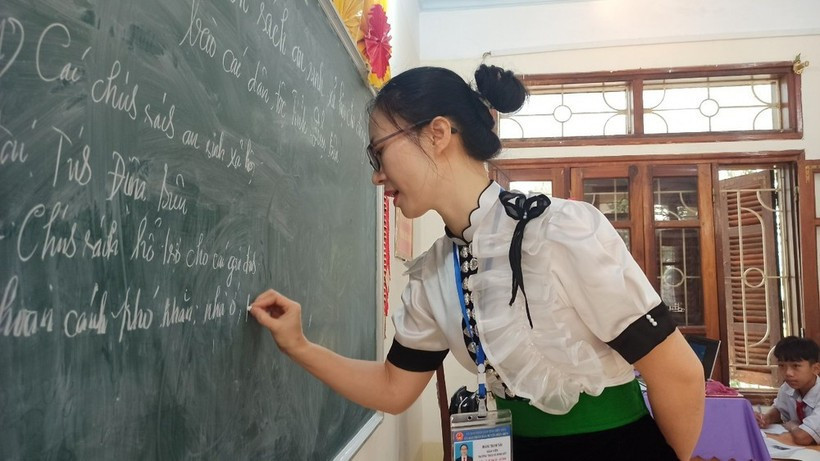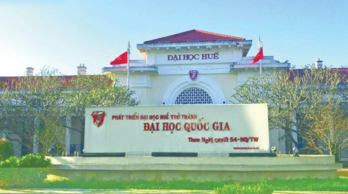
A session at Pom Lot Lower Secondary School in Dien Bien province. (Photo: VietnamPlus)
At the national conference reviewing the 2024–2025 academic year held on August 22, Deputy Minister of Education and Training Pham Ngoc Thuong highlighted that institutional and policy reforms were regarded by the ministry’s leaders as a breakthrough in the sector’s progress.
The issuance of the Law on Teachers was underscored as a significant milestone, reaffirming the Party and State’s major policy of honouring, supporting, protecting, and developing the teaching workforce, the core pillar of the education cause.
In addition, the National Assembly adopted a resolution on universal preschool education for children aged 3–5 and on tuition fee exemptions and assistance for preschool and general school students.
Thuong further noted that the ministry is finalising three draft laws on Education, Higher Education, and Vocational Education to submit to the Government for consideration and presented to the 10th session of the 15th National Assembly in October 2025.
The ministry is also drafting a scheme to designate English as a second language in schools for submission to the Prime Minister, and has proposed to the Government and the Politburo a groundbreaking resolution on education, which includes making artificial intelligence (AI) an official subject in the general education curriculum.
According to the Deputy Minister, education outcomes in the 2024–2025 school year surpassed those of the previous year across all indicators and levels.
By June 2025, all provinces and centrally-run cities had sustained and achieved universal primary and lower secondary education standards; 27% had reached level-2 lower secondary universalisation (up 4% year-on-year), and 19% had attained level-3 (up 6%).
The 2018 General Education Curriculum was rolled out nationwide from grade 1 - 12, completing the cycle of curriculum and textbook reforms. Innovative teaching methods such as thematic, project-based, integrated instruction, STEM education, and creative experiential activities were introduced in diverse forms.
Vietnam also continued to perform strongly in international benchmarks. The 2022 PISA cycle report, released on June 19, 2025, showed Vietnam maintaining high regional rankings and approaching the OECD average in Mathematics, Reading, and Science.
In specialised education, Vietnamese students won 33 medals at international competitions, with national teams in Olympiads and international science-technology contests consistently ranking among the world’s top 10 out of 113 participating countries and territories.
The 2025 National High School Graduation Examination was held successfully, despite challenges. It was the first to be conducted under two curricula, the largest ever with over 1.16 million candidates, and took place amid administrative boundary mergers.
Higher education continued to expand in scale and improve its standing in international rankings.
The teaching workforce and education managers received increased attention in terms of both quantity and quality, while localities invested in upgrading school infrastructure.
Digital transformation advanced significantly, with the education sector’s database nearly completed, comprising 24.55 million records linked to national databases. The online admissions system on the National Public Service Portal was upgraded to full-process functionality, enabling 100% of candidates to register for graduation exams and higher education admissions entirely online.
Despite these achievements, several limitations remain. Some schools still face difficulties in developing school education plans and in implementing integrated subjects, career-oriented experiential activities, and local education content. Student-centred assessment methods in some areas remain formalistic.
Disparities persist in learning conditions across regions and groups. Teacher shortages are widespread, while some localities still lack classrooms, subject-specific rooms, and essential teaching equipment. Challenges also remain in fostering ethics, lifestyle, and life skills among students, as well as in providing psychological counselling, and preventing school violence, bullying, abuse, and food safety risks.
Minister of Education and Training Nguyen Kim Son stressed that candidly acknowledging these shortcomings, together with the constructive input provided at the conference, will be crucial for the ministry in refining plans, key tasks, and solutions for the 2025–2026 academic year./.
VNA
Source: https://en.vietnamplus.vn/groundbreaking-reforms-drive-education-in-20242025-academic-year-post326834.vnp
 Vietnamese universities make major leaps in QS sustainability rankings
Vietnamese universities make major leaps in QS sustainability rankings



